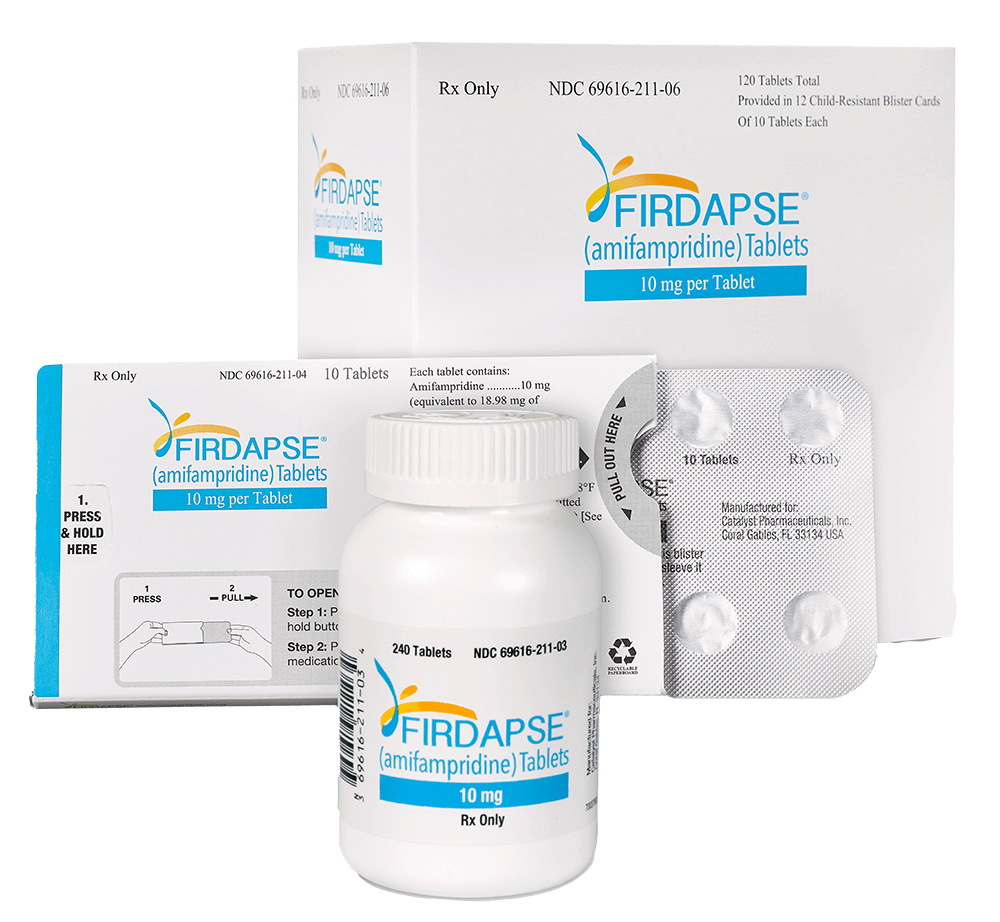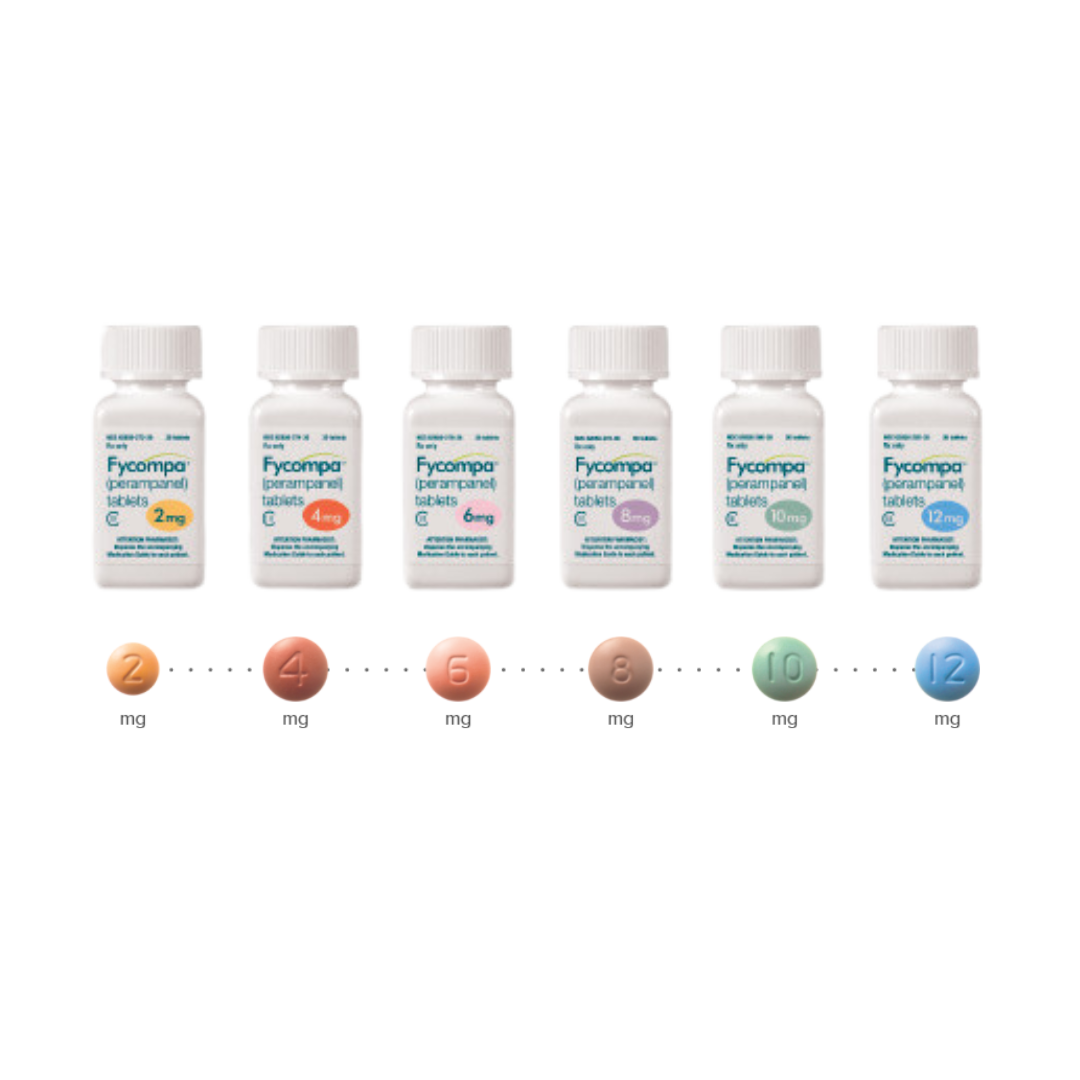Current Approved Products
As part of Catalyst’s commitment to developing and commercializing innovative first-in-class medicines that address rare neurological and epileptic diseases, Catalyst has the following FDA-approved products:

AGAMREE® is a corticosteroid with a novel structure that retains the potent anti-inflammatory effects of traditional corticosteroids used in Duchenne muscular dystrophy.1,2
Intended for US residents only
-
AGAMREE (vamorolone) Oral Suspension [prescribing information]; 2023.
- Hoffman E. PPMD Annual Conference 2021.
View U.S. Prescribing Information (PI)
IMPORTANT SAFETY INFORMATION
AGAMREE is a prescription medicine used to treat Duchenne muscular dystrophy (DMD) in patients 2 years of age and older
IMPORTANT SAFETY INFORMATION
Patients should not take AGAMREE if they are allergic to vamorolone or any of the inactive ingredients in AGAMREE.
What is the most important information I should know about AGAMREE?
- Do not stop AGAMREE, or change the amount taken, without first checking with your healthcare provider. There may be a need for gradual dose reductions to decrease the risk of adrenal insufficiency crisis, which can be fatal.
- There is an increased risk of infection when taking corticosteroids like AGAMREE. Tell your healthcare provider if the patient has had recent or ongoing infections or has recently received a vaccine. Seek immediate medical advice in the case of fever or other signs of infection. Some infections can be severe, and sometimes fatal. Patients should avoid exposure to chickenpox or measles; alert your healthcare provider immediately if exposure occurs.
- Corticosteroids, including AGAMREE, can cause an increase in blood pressure and water retention. Your healthcare provider may monitor for these increases during treatment.
- Corticosteroids, including AGAMREE, can cause severe behavioral and mood changes. Seek medical attention if behavioral or mood changes develop.
- There is a risk of osteoporosis with prolonged use of corticosteroids like AGAMREE, which can lead to vertebral and long bone fractures.
- Corticosteroids like AGAMREE may cause cataracts or glaucoma. Your healthcare provider should monitor for these conditions if AGAMREE treatment continues for more than 6 weeks.
Immunizations should be up to date according to immunization guidelines prior to starting therapy with AGAMREE. Live‑attenuated or live vaccines should be administered at least 4 to 6 weeks prior to starting AGAMREE. Live‑attenuated or live vaccines should not be administered in patients taking AGAMREE. Before taking AGAMREE, tell your healthcare provider about all medical conditions, including if the patient:
- has decreased liver function
- is pregnant or planning to become pregnant. AGAMREE can harm an unborn baby.
- is breastfeeding or planning to breastfeed. AGAMREE may appear in breastmilk and could affect a nursing child.
Certain medications can cause an interaction with AGAMREE. Tell your healthcare provider about all the medicines the patient takes, including prescription and over-the-counter medicines, dietary supplements, and herbal products.
What are the possible side effects of AGAMREE?
The most common side effects with AGAMREE include facial puffiness (cushingoid features), psychiatric disorders, vomiting, weight gain, and vitamin D deficiency. These are not all the possible side effects of AGAMREE.
Call your doctor for medical advice about side effects.
Please see full Prescribing Information for additional Important Safety Information.
To report SUSPECTED ADVERSE REACTIONS, contact Catalyst Pharmaceuticals, Inc. at 1-844-347-3277 or FDA at 1-800-FDA-1088 or www.fda.gov/medwatch.

Visit our product website for more information.
Intended for US residents only
View U.S. Prescribing Information (PI)
INDICATION AND IMPORTANT SAFETY INFORMATION
FIRDAPSE is a potassium channel blocker indicated for the treatment of Lambert-Eaton myasthenic syndrome (LEMS) in adults and pediatric patients 6 years of age and older.
CONTRAINDICATIONS
FIRDAPSE is contraindicated in patients with:
- A history of seizures
- Hypersensitivity to amifampridine phosphate or another aminopyridine
WARNINGS AND PRECAUTIONS
Seizures: FIRDAPSE can cause seizures. Consider discontinuation or dose-reduction of FIRDAPSE in patients who have a seizure while on treatment. FIRDAPSE is contraindicated in patients with a history of seizures.
Hypersensitivity: If a hypersensitivity reaction such as anaphylaxis occurs, FIRDAPSE should be discontinued and appropriate therapy initiated.
Please see full Prescribing Information for additional Important Safety Information.
To report SUSPECTED ADVERSE REACTIONS, contact Catalyst Pharmaceuticals at 1-844-347-3277 (1-844-FIRDAPSE) or FDA at 1-800-FDA-1088 or www.fda.gov/medwatch.


FYCOMPA is a prescription medicine used alone or with other medicines to treat partial-onset seizures with or without secondarily generalized seizures in people with epilepsy aged 4 and older and with other medicines to treat primary generalized tonic-clonic seizures in people with epilepsy aged 12 and older.
Intended for US residents only
View U.S. Prescribing Information (PI)
USES AND IMPORTANT SAFETY INFORMATION
FYCOMPA may cause mental (psychiatric) problems, including:
new or worse aggressive behavior (including homicidal behavior), hostility, anger, anxiety, or irritability; being suspicious or distrustful (believing things that are not true); seeing objects or hearing things that are not there; confusion; difficulty with memory; other unusual or extreme changes in behavior or mood. Tell your healthcare provider right away if you have any new or worsening mental problems while taking FYCOMPA.
What is FYCOMPA (perampanel)?
FYCOMPA is a prescription medicine used alone or with other medicines to treat partial-onset seizures with or without secondarily generalized seizures in people with epilepsy aged 4 and older and with other medicines to treat primary generalized tonic-clonic seizures in people with epilepsy aged 12 and older.
Like other antiepileptic drugs, FYCOMPA may cause suicidal thoughts or actions in a very small number of people, about 1 in 500. Call your healthcare provider right away if you have any of these symptoms, especially if they are new, worse, or worry you:
thoughts about suicide or dying; new or worse depression; feeling agitated or restless; trouble sleeping (insomnia); acting aggressive; being angry, or violent; an extreme increase in activity and talking (mania); attempt to commit suicide; new or worse anxiety; panic attacks; new or worse irritability; acting on dangerous impulses; other unusual changes in behavior or mood. Suicidal thoughts or actions can be caused by things other than medicines. If you have suicidal thoughts or actions, your healthcare provider may check for other causes.
Pay attention to any changes especially sudden changes in mood, behaviors, thoughts, or feelings and keep all follow-up visits with your healthcare provider as scheduled. Call your healthcare provider between visits as needed, especially if you are worried about symptoms.
Do not stop FYCOMPA without first talking with your healthcare provider.
Stopping suddenly can cause serious problems and can cause you to have seizures more often.
Before taking FYCOMPA, tell your healthcare provider about all of your medical conditions, including if you:
have or have had depression, mood problems, aggressive or hostile behavior (for example, homicidal behavior), suicidal thoughts or behavior, or other psychiatric problems; have liver or kidney problems; drink alcohol; have abused prescription medicines, street drugs, or alcohol in the past; are pregnant or plan to become pregnant. It is not known if FYCOMPA will harm your unborn baby. If you become pregnant while taking FYCOMPA, talk to your healthcare provider about registering with the North American Antiepileptic Drug Pregnancy Registry (1-888-233-2334); are breastfeeding or plan to breastfeed. Talk to your healthcare provider about the best way to feed your baby if you take FYCOMPA and to decide if you will take FYCOMPA or breastfeed. You should not do both.
Tell your healthcare provider about all the medicines you take,
including prescription and over-the-counter medicines, vitamins, and herbal supplements. Taking FYCOMPA with certain other medicines can cause side effects or reduce either drug’s benefit. These medicines include: birth control, carbamazepine, phenytoin, oxcarbazepine, rifampin, and St. John’s Wort.
What should I avoid while taking FYCOMPA?
Do not drive, operate heavy machinery, or do other dangerous activities until you know how FYCOMPA affects you. FYCOMPA may make you dizzy, sleepy, or tired. Do not drink alcohol or take other medicines that make you sleepy or dizzy until you talk to your healthcare provider. FYCOMPA taken with alcohol or medicines that cause sleepiness or dizziness may make your sleepiness or dizziness worse. FYCOMPA when taken with alcohol may also make your mood worse, increase anger, confusion, and depression.
FYCOMPA may cause other serious side effects, including: Dizziness, vertigo (sense of spinning), and problems walking normally.
You may have problems walking normally if you are unsteady because you feel dizzy. These symptoms can increase when your dose of FYCOMPA is increased. Your risk of feeling dizzy and having problems walking normally may be higher if you are elderly; Sleepiness and tiredness; Increased risk of falls. Taking FYCOMPA can increase your chance of falling. These falls can cause serious injuries. Your risk of falling may be higher if you are elderly; A serious allergic reaction that may affect your skin or other parts of your body such as your liver, kidneys, heart, or blood cells. This allergic reaction can be life-threatening and can cause death. Call your healthcare provider right away if you have: a skin rash, hives; fever or swollen glands that do not go away; swelling of your face; shortness of breath; swelling of the legs; yellowing of the skin or whites of the eyes; or dark urine
The most common side effects of FYCOMPA include:
dizziness; sleepiness; tiredness; irritability; falls; nausea and vomiting; weight gain; vertigo (sense of spinning); problems walking normally; problems with muscle coordination; headache; bruising; abdominal pain; anxiety
FYCOMPA is a controlled substance (CIII) because it can be abused or lead to drug dependence. Keep FYCOMPA in a safe place to protect it from theft and never give it to anyone else because it may harm them. Selling or giving away FYCOMPA is against the law.
You are encouraged to report negative side effects of prescription drugs to the FDA. Visit www.fda.gov/medwatch or call 1-800-FDA-1088.
Please see full Prescribing Information for additional Important Safety Information and Medication Guide for FYCOMPA.